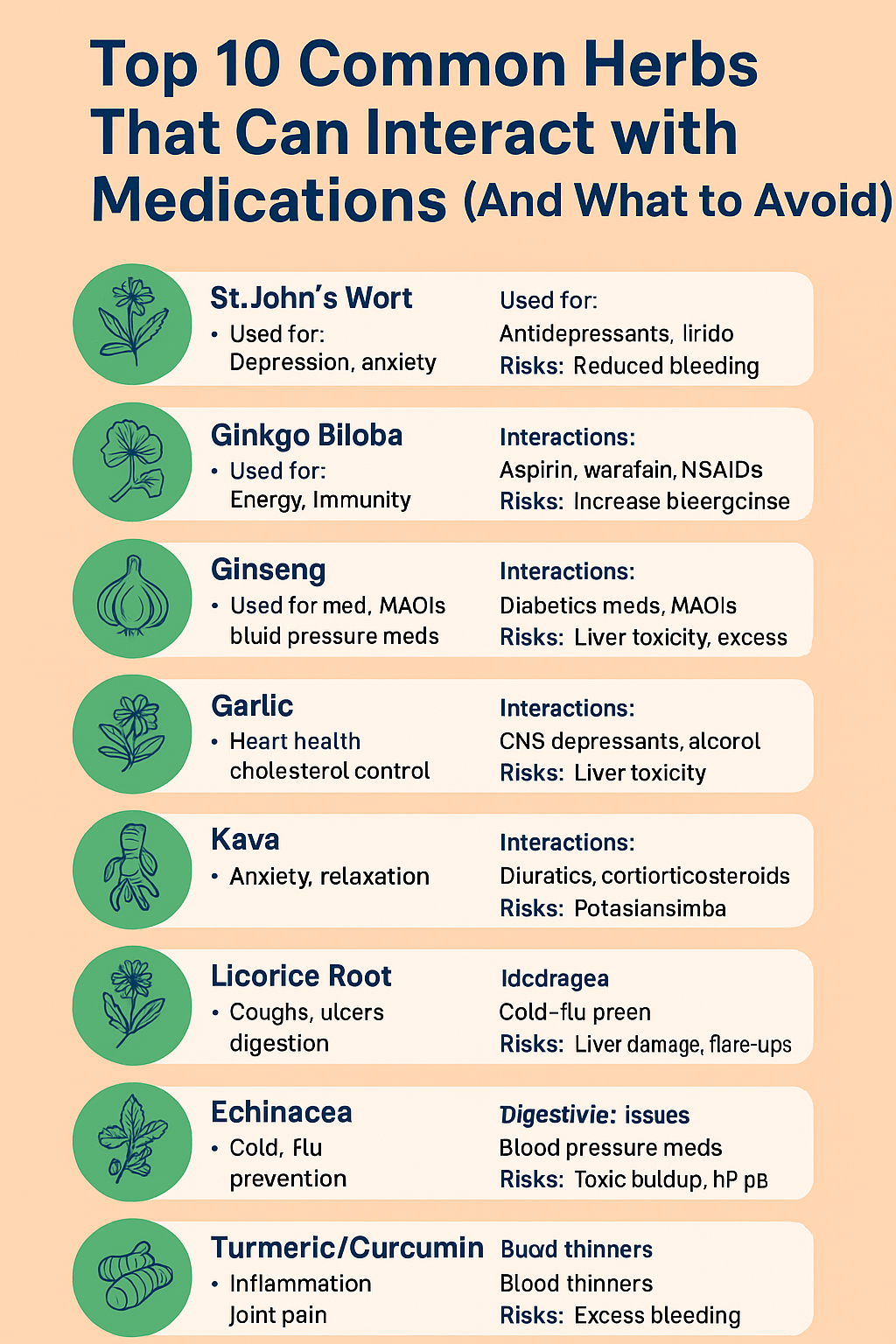Top 10 Common Herbs That Can Interact with Medications (And What to Avoid)
Herbal remedies have become a go-to for many seeking natural ways to support health. But while herbs may seem harmless, some can dangerously interact with prescription medications. These interactions can reduce drug effectiveness, intensify side effects, or lead to serious health risks. Knowing which herbs to avoid when on medication is not just smart—it’s essential.
Why Herb-Drug Interactions Matter
Many herbs affect how medications are absorbed, broken down, or eliminated from the body. Some herbs may increase the potency of a drug, leading to overdose-like symptoms. Others may block the effectiveness of important medications. These interactions are often underestimated because herbs are sold as supplements without strong regulation or warnings.
Top 10 Herbs That Can Interact with Medications
1. St. John’s Wort
- Used for: Depression, anxiety
- Interactions: Antidepressants, birth control, HIV meds, blood thinners
- Risks: Reduced drug levels, serotonin syndrome
2. Ginkgo Biloba
- Used for: Memory, cognitive support
- Interactions: Aspirin, warfarin, NSAIDs
- Risks: Increased bleeding, seizure risk
3. Ginseng
- Used for: Energy, immunity, libido
- Interactions: Diabetes meds, MAOIs, blood pressure meds
- Risks: Blood sugar swings, high blood pressure
4. Garlic (Supplement Form)
- Used for: Heart health, cholesterol control
- Interactions: Blood thinners, HIV drugs
- Risks: Bleeding risk, reduced antiviral effectiveness
5. Kava
- Used for: Anxiety, relaxation
- Interactions: CNS depressants, alcohol, liver meds
- Risks: Liver toxicity, excessive drowsiness
6. Licorice Root
- Used for: Coughs, ulcers, digestion
- Interactions: Diuretics, corticosteroids
- Risks: Potassium imbalance, hypertension
7. Echinacea
- Used for: Cold, flu prevention
- Interactions: Immunosuppressants, liver enzymes meds
- Risks: Liver damage, autoimmune flare-ups
8. Goldenseal
- Used for: Digestive issues, infections
- Interactions: Blood pressure meds, liver-metabolized drugs
- Risks: Toxic buildup, high blood pressure
9. Turmeric/Curcumin
- Used for: Inflammation, joint pain
- Interactions: Blood thinners, diabetes meds
- Risks: Excess bleeding, low blood sugar
10. Valerian Root
- Used for: Sleep, anxiety
- Interactions: Sedatives, antidepressants
- Risks: Drowsiness, impaired focus
Tips for Safe Use of Herbs with Medications
- Always consult a doctor or pharmacist before using herbs with prescriptions.
- Introduce one herb at a time and monitor for side effects.
- Avoid “proprietary blends” with undisclosed ingredients.
Downloadables
Infographic:

Download PDF Guide:
Herb-Drug Interaction Guide (PDF)
Conclusion
Natural doesn’t always mean safe. While herbs can support wellness, combining them with prescription drugs without caution may lead to serious consequences. Stay informed, ask questions, and take a mindful approach to herbal remedies.
📬 Like content like this? Subscribe to our newsletter or explore more on BasicKnowledges.com.
